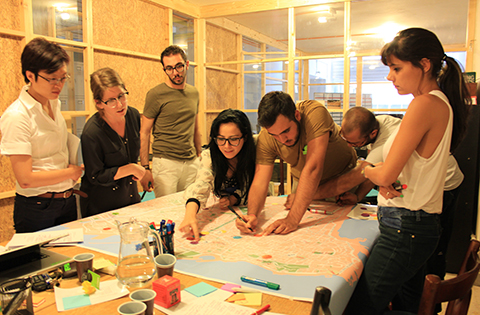2016-2017 University Catalog [Archived Catalogue]
Design for Social Impact, Master in Design Studies
|
|
Programs > Programs in the College of Art, Media, & Design
Contacts Description Program Objectives Program Requirements

Quick Links
College of Art, Media & Design
Contacts
Anthony Guido \ aguido@uarts.edu \ 215.717.6251
Program Director
The Design for Social Impact MDes is not currently accepting applications for admission to the program.
Description
The Design for Social Impact MDes prepares students to become leading agents of social change, instrumental in fostering strategic creativity, organizational learning, and community engagement. This two-year, 60-credit curriculum is structured around a careful balance of classroom learning and reflection and real-world application of design practice. Our partnership projects with businesses, government agencies, non-profit organizations, and community groups offer the perfect opportunity to put learning into practice and gain valuable outside perspectives on the power of design to create meaningful impact. Students in the program have access to currently practicing design professionals with backgrounds in fields ranging from architecture, environmental design, industrial design, interaction design, social design, design strategy, design research, cultural anthropology, psychology, industrial systems, organizational development, business, and entrepreneurship.
Our curriculum is project-based, which means that each semester’s course content is integrated around studio-based projects. Seminars, lectures, workshops, and critiques from both faculty and leading outside professionals create a dynamic studio environment. Academically, there is great freedom to engage in self-directed and independent projects, including a final thesis project that reflects the student’s personal design interests.
Program Objectives
- Develop expertise in applying human-centered design process, methods, and tools — research, synthesis, ideation, prototyping, and user testing — to the development, production, and iteration of innovative design interventions in a range of situations and formats.
- Develop an understanding of the contextual, theoretical, and historical evolution of social impact design practices and techniques, and relate these to current philosophies and best practices in the field.
- Develop skills of emotional intelligence, facilitation, and leadership that support the design student’s ability to maneuver effectively in complex organizational and social situations.
- Master a collaborative and participatory co-design process that places the people and organizations designers work with at the center of the design process.
- Develop and practice the use of design tools for community engagement, conversation, and collective learning in order to facilitate a participatory, co-design process.
- Develop an understanding of fundamental business and entrepreneurial perspectives, terminology, and practices as they apply to the opportunity for design and designers to have measurable impact in these domains.
- Develop the ability to communicate the value/role of design/designer in a range of contexts for diverse audiences through visually compelling and narratively rich documentation and presentations that effectively communicate the design process and project outcomes.
- Deliver an independently directed design thesis project that demonstrates expertise in the use of methods and tools for design for social impact as applied in real-world contexts with actual people and organizations.
- Embark on numerous professional pathways which require expertise in design process and design thinking, design research, strategic planning and organizational change, community engagement and collaboration that are supported by visual thinking, visual communication, and strategic thinking.
Program Requirements (60 credits)
|